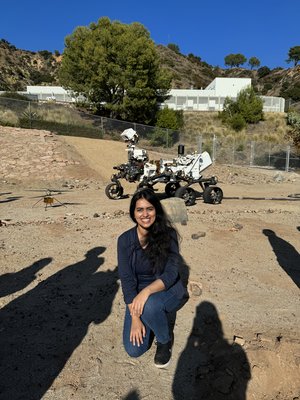
Dr. Akshata Krishnamurthy
Principal Investigator / Science Phase Lead
About
Bio
Dr. Krishnamurthy brings a wide breadth of expertise in flight systems engineering, instrument calibration, science performance modeling and small satellites. She is the Principal Investigator on the Strategic University Research Partnership (SURP) program in collaboration MIT, which is focused on developing and implementing a systematic framework for optimization of space missions. She serves as Science Phase Lead on the NASA-ISRO Synthetic Aperture Radar (NISAR) mission. She is also a Robotic Operations Systems Engineer on the Sampling and Caching Team for M20 Perseverance Rover Operations. Prior to this, she served as co-investigator on the “Constellation for Transiting Earth Analogs” study for the NASA AS3 Program, as Science Data System Lead on JPL’s ASTERIA mission, and an instrument engineer on NASA’s Transiting Exoplanet Survey Satellite (TESS) mission. She completed her Ph.D. in Space Systems Engineering from the Aeronautics and Astronautics Department at the Massachusetts Institute of Technology (MIT). Dr. Krishnamurthy has won numerous awards and accolades for her work, including:
- 2024 Most Powerful Women List by Fortune India
- 2024 Science and Innovation Award by Women's Aerospace Network
- 2024 NASA Honor Group Achievement Award for exceptional performance in collecting and sealing 23 scientifically valuable Martian samples and creating the first Sample Depot cache on another planet as part of Mars 2020 Perseverance Rover Mission
- 20 under 35 Outstanding Space Professionals List by Space and Satellite Professionals International (SSPI) in 2021
- 2020 NASA Honor Group Achievement Award for ingenious use of a CubeSat to achieve key scientific investigations on the ASTERIA Mission
- 2019 NASA Silver Group Achievement Medal for contributions to the Transiting Exoplanet Survey Satellite (TESS) Mission
- 2018 Emerging Space Leader Award by the International Astronautical Federation (IAF)
- 2017 Luigi G. Napolitano Award by the International Astronautical Federation (IAF)
Topic Area(s)
- Astrophysics and Space Science | Exoplanet Discovery And Science
- Sensors, Microdevices and Instruments | Observatory Technologies
- Software, Modeling, Simulation, and Information Processing | Mission Architecture, Systems Analysis, And Concept Development
- Artificial Intelligence, Machine Learning, and Data Science | Uncertainty Quantification (UQ)